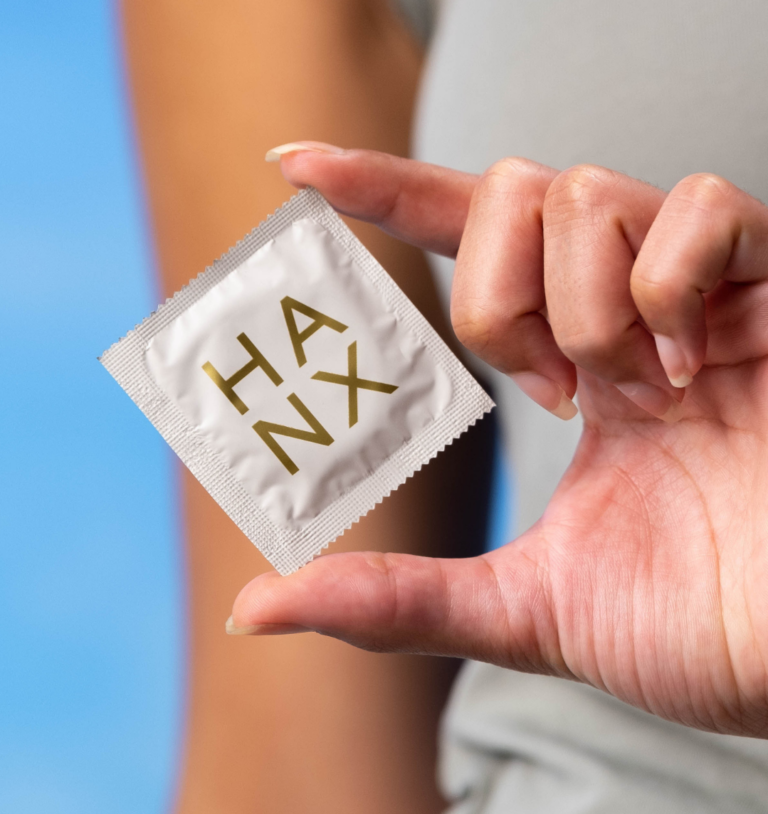If you’ve ever noticed irritation, dryness, or general discomfort after sex (the kind that lingers for hours or even days), there’s a chance the condom you’re using isn’t the culprit. It might be what is covering it up…
For those trying to avoid pregnancy, spermicide-lubricated condoms can be a great option. But the “extra protection” that comes with this chemical can also come at a real cost, particularly for people with a vulva. And honestly? Added spermicide can actually do more harm than good. We’ve been advocates for natural condoms since HANX launched in 2017. So buckle up as we explore what spermicide actually is, why you should check the ingredients list on your extra-lubricated condoms, and why you’ll never find it in HANX johnnies…
Is spermicide safe?
The spermicide works by disrupting the sperm, essentially slowing it down or preventing it from swimming. The active ingredient, usually nonoxynol-9 (N-9), is quite aggressive in its work, which is ideal if you’re trying to neutralize sperm. However, it’s less good if it also disrupts the delicate balance of your vaginal tissue…
As our co-founder and company gynecologist Dr Sarah Welsh will tell you, your vagina is lined with very delicate mucous membranes that maintain a specific pH and a specific microbiome. They are part of how your body regulates health and comfort. The spermicide unfortunately does not distinguish between attacking the sperm and destroying the vaginal tissue – and this is where the problems can begin.
While working in NHS sexual health, Sarah saw patients develop inflammation, micro-tears in the vaginal wall and disruption of beneficial bacteria, thanks to repeated exposure to N-9. For some, this is a mild annoyance. For others, especially those with sensitive skin or vaginal microbiome issues, it can cause itching, burning, increased risk of yeast infections or urinary tract infections (UTIs). Some research has even suggested that N-9 may increase the chance of contracting an STD by compromising the protective barrier of your vaginal tissue. No thanks…
Pleasure and Pain
Using spermicide-coated condoms also puts your pleasure at risk. Practically speaking, if spermicide leaves you irritated, sore, or battling a UTI, you’re more likely to experience discomfort during penetrative sex—or pain afterward. This can greatly affect your arousal and libido, sexual satisfaction, and your desire to use condoms at all (don’t be tempted to!). It’s a vicious cycle: hard condoms make sex less enjoyable, so people are tempted to skip protection, just when protection matters most.
In short: spermicide was not designed with vaginal comfort in mind. Aches, pains and UTIs have just been dismissed as an unfortunate side effect rather than a design flaw. We think it’s time to change that…
The Confusion Around “Extra Lubricated”
So, how do you know if your condoms contain spermicide? When you see “extra lubricated” condoms, you might assume they’re simply coated with a mild lubricant (like our HANX Extra Lubricated variety). Sometimes it is. But often in mainstream condoms, this “extra lubrication” contains spermicide. You might pick up a pack as you want to minimize friction, but end up putting an irritant directly into your sensitive vaginal tissue.
The best way to avoid spermicide-coated condoms is to look for natural options. HANX Extra Lubricant Condoms do not contain any spermicide. Just genuine generous lubrication that is there to enhance sensation and comfort without unwanted side effects. Latex is already effective by itself. lubrication is just… well, lubrication.
If you want to avoid spermicide, check the ingredient list of your condoms to make sure it doesn’t contain nonoxynol-9 (N-9). You can also switch to natural condoms, like HANX, which include minimal ingredients and no unnecessary, harsh chemicals.
Also remember that condoms are 98% effective when used correctly. While spermicide-coated condoms may sound like they can give you extra peace of mind, focusing on best practices with standard johnnies offers similar protection against pregnancy and STDs without the potential pain. Find our top tips for proper condom placement here.
As for soothing vaginal dryness or friction? In addition to switching to extra-lubricated condoms, trying a pump or two of good quality, mild water-based lube can help minimize any discomfort during sex or masturbation.
Make the switch
If you’ve been using spermicide-lubricated condoms and have experienced irritation, recurring infections, or general discomfort, try switching to natural alternatives with spermicide-free extra fertilization. Your vagina will thank you, your sex life will likely improve, and you’ll still have reliable contraception.
As Dr. Sarah always says, sexual health is not just about preventing pregnancy or STDs. It’s all about how you feel about sex, whether you feel comfortable and whether your body is trying to tell you that something is wrong. If spermicide-coated condoms and the resulting pain have been a part of your sex life for years, it might be worth listening to what your body is saying all the time…
Want more?
- Learn how to put on a condom correctly with our sexual health experts.
- Looking for spermicide-free alternatives? Meet our natural, super-lubricating condoms. Here’s why you’ll love them.
